Benjamin Franklin famously wrote that “nothing can be said to be certain, except death and taxes.” While at the time of writing there’s no way to negate death, I can’t help but feel like he didn’t tell the full story when it comes to the tax situation.
Many well structured business owners and investors have made the news by reducing their tax bill to $0 (or less). In fact, many countries around the globe do not levy any kind of income tax on their citizens or residents.
If you live somewhere with high taxes you might be considering a move to what many people consider to be a tax haven.
Before you start packing however, you should be aware that not all of these countries are what you’d call bucket list destinations. And while some may be fun for a visit, choosing to call them home is a whole other commitment.
Read on with me, and dig a little deeper.
Is It Still Income Tax if It’s Called Something Else?
Keep in mind that income tax is subjective. Some these countries have taxes that resemble income tax, only with a different name.
My overall message is—income tax is only one piece of the puzzle. If you’re seeking a better life by relocating yourself or your family, I hope this list will go to show that tax should be one of many considerations.
Just because you can reduce your taxes doesn’t mean that you pocket a heap of cash each month. Often the governments in these countries make money without taxes through ‘fees’, ‘levies’ and ‘duties’.
Similarly, as you go through this list you’ll see details of sales, payroll and social security taxes. These are not necessarily the exact terms each government uses, so I’ve had to use some creative license here.
Regardless, they all mean the same thing—you or your company will be paying a portion of your income to the government each year. The purpose of these statistics is is to give you some data points to compare in addition to that 0% rate of income tax.
Consider the Bigger Picture
Many other things that affect cost of living and financial secure, like property taxes, food and utilities, as well as the often much lower salaries in these locations.
In many cases, you may not end up being any richer by relocating. In some of these countries, you’ll almost definitely end up poorer.
In addition to this, remember that life isn’t all about finances. It’s very likely that healthcare isn’t up to your standard, schooling is either limited or insanely expensive for anything of quality, and personal security can be a real issue.
What’s the price you’re willing to pay for you and your family’s everyday safety and happiness?
Countries With No Income Tax
Listed in alphabetical order, the following countries have no personal income tax.
While some of these countries or territories are a dream to live in, there are probably more than a few that you may not feel comfortable calling home.
Still, this is a fun thought exercise and I’m excited to share these countries with you!
Antigua and Barbuda
- Population: ~93,200 (2021)
- Income Rate: 0%
- Corporate Rate: 25%
- Sales Rate: Up to 15% VAT
- Payroll Rate: 0%
- Social Security: 11.5%
Named after it’s 2 largest islands, Antigua and Barbuda is a sovereign country in the West Indies made up of several islands.
Once a struggling nation, it now features a competitive financial services industry, which has brought a much higher standard of living to it’s people.
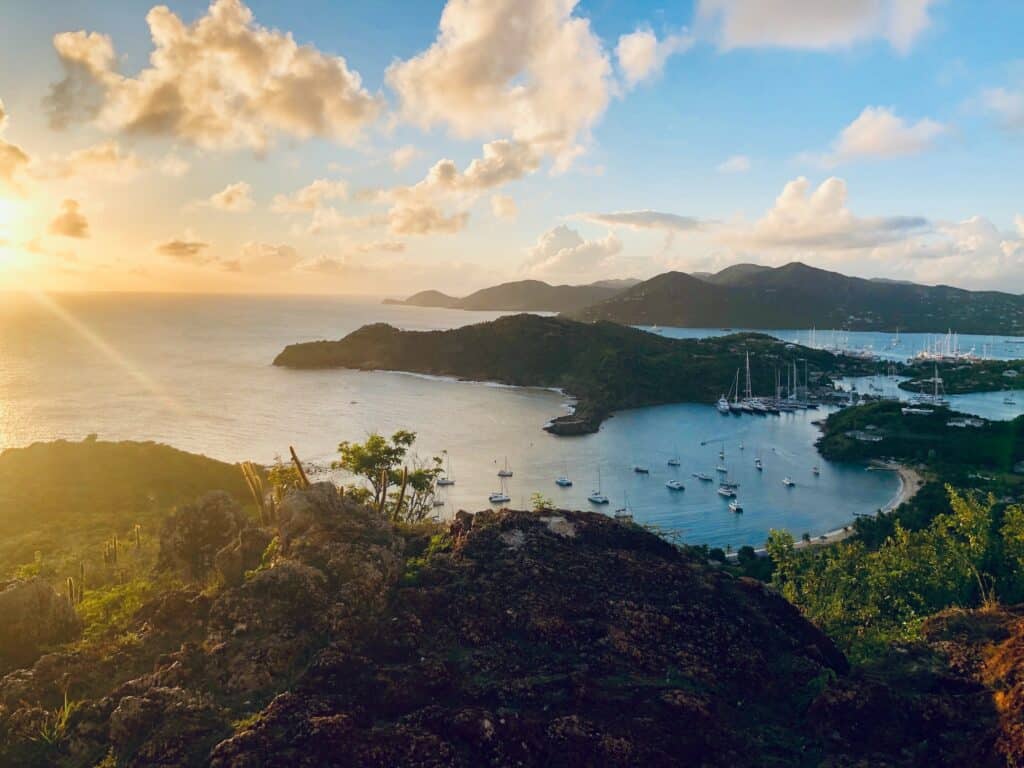
While there is technically 0% charged on income, in order to qualify as a resident you need to pay a flat fee of $20,000 per year. So straight off the bat, we can see that ‘no income tax’ doesn’t actually mean you get to keep 100% of what you earn.
One of many island locations in this list, there’s no doubt that you can get some impressive views and gorgeous sunny days as a result of living here.
For those seriously considering relocating to a no or low tax country, it’s worth knowing that the weather here is much more agreeable than other parts of the Caribbean.
The Bahamas
- Population: ~408,000 (2021)
- Income Rate: 0%
- Corporate Rate: 0%
- Sales Rate: 12% VAT
- Payroll Rate: 0%
- Social Security: 9.8%
Another country of islands in the Caribbean, the Bahamas imposes zero tax on income on its residents.
This courtesy also extends to wealth, inheritance and corporate profit taxes, making it a desirable location for foreign nationals and companies alike.
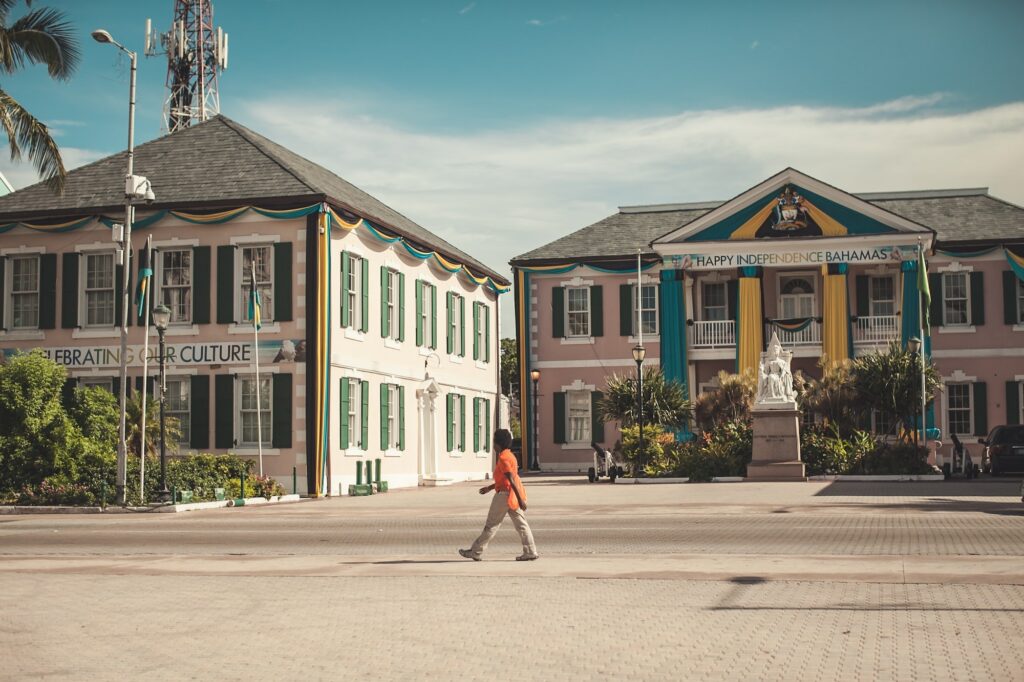
Renewable annually, a temporary residence permit will set you back $1,000. Relocating here on a more permanent basis requires a property investment of at least $250,000.
The cost of living is on the high end, but depending on your income, the tax benefits can help to offset this. For many, the idyllic setting is worth the outlay.
Crime can be an issue here, but like a lot of places, it depends where you live. Many expats choose to live in gated communities as a result.
Bahrain
- Population: ~1,463,000 (2021)
- Income Rate: 0%
- Corporate Rate: 0% for most sectors, 1% for oil and gas
- Sales Rate: 5% VAT
- Payroll Rate: 0%
- Social Security: Up to 19%
Tucked away in the Middle East, it’s relatively easy to obtain permanent residence in Bahrain.
While you don’t need to marry a local or have a work contract, you will still need to cough up a considerable amount to live here as an expat.
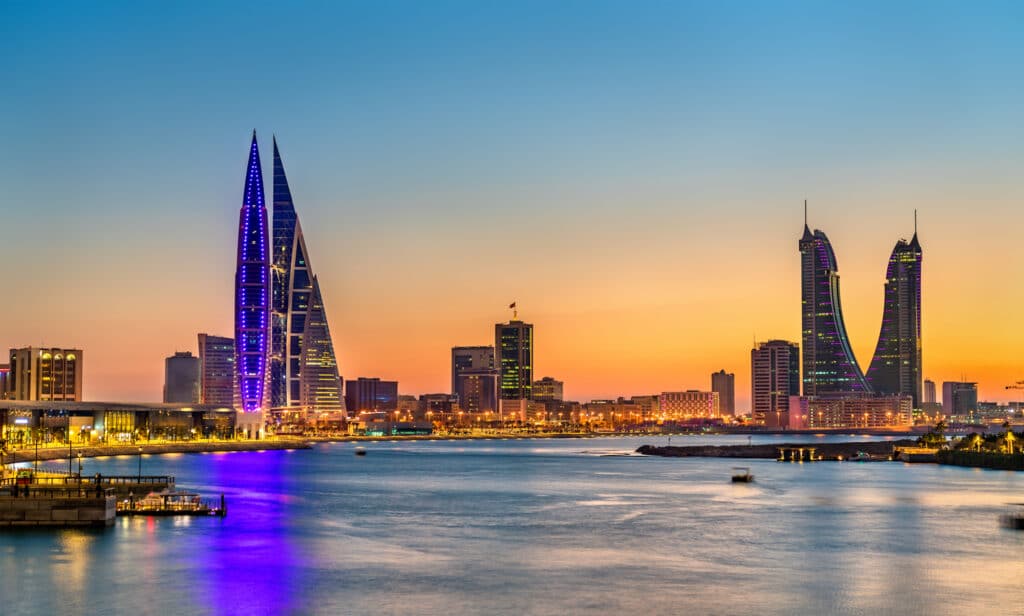
Specifically, you must purchase property worth at least $132,000 or invest $266,000 in a local company. You’ll need to show a monthly income of at least $1,350 as well. Bahrain also has a golden residency visa for qualifying foreigners.
Recognised as the happiest country in the Arab World, Bahrain offers a high quality of life along with a welcoming and tolerant society.
On the downside, citizenship requires living there for 25 consecutive years and well as fluent Arabic.
Bermuda
- Population: ~64,000 (2021)
- Income Rate: 0%
- Corporate Rate: 0%
- Sales Rate: 0%
- Payroll Rate: Up to 12.5%
- Social Security: Up to 10%
You’ll find Bermuda in the North Atlantic Ocean north of Puerto Rico. Although there is isn’t tax charged on income, the government does levy a payroll tax.
A well known tax haven for the very wealthy, living here is extraordinarily expensive.
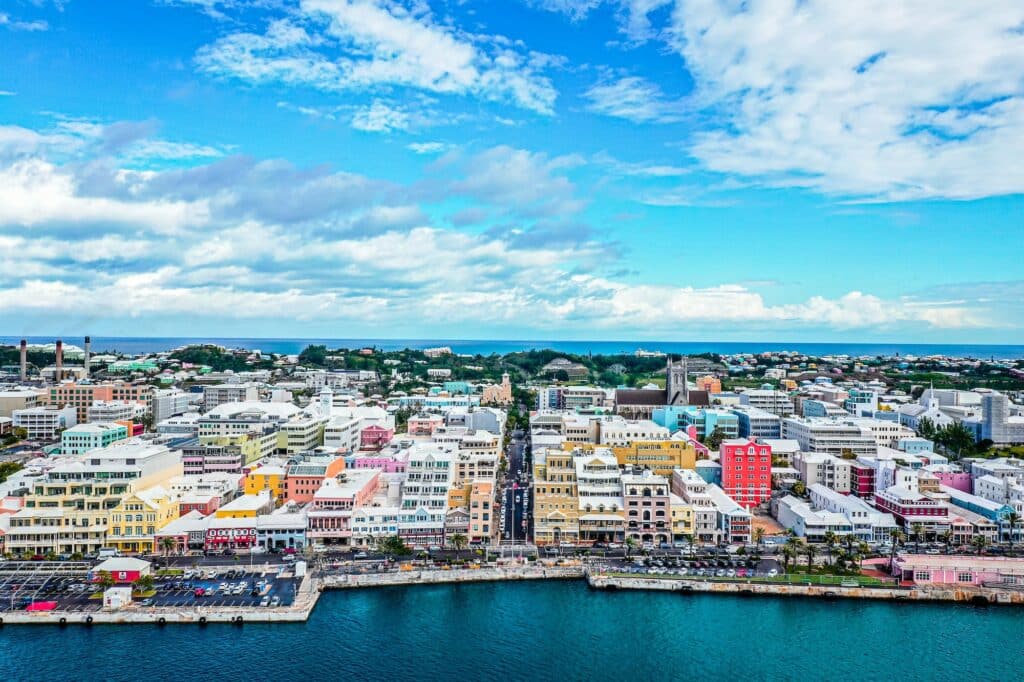
Obtaining permanent residence is easy if you’re married to a Bermudian resident—you simply pack your bags and hop on a flight. Alternately, you’ll need to be an ordinary resident for at least 15 years prior.
You can however, apply for a short-term visa, which will allow you to holiday here for up to six months. This is a popular path for those planning to later relocate as it’s enough time to figure out if you really want to put down roots there.
The British Virgin Islands
- Population: ~31,000 (2021)
- Income Rate: 0%
- Corporate Rate: 0%
- Sales Rate: 0%
- Payroll Rate: Up to 14%
- Social Security: 9.5%
Part of a volcanic archipelago in the Caribbean, the British Virgin Islands is also a British Overseas Territory. Considered by many to be the best country to incorporate an online business, the same is rarely said about gaining residency there.
Without permanent employment, settling in the BVI is extremely difficult and expensive.
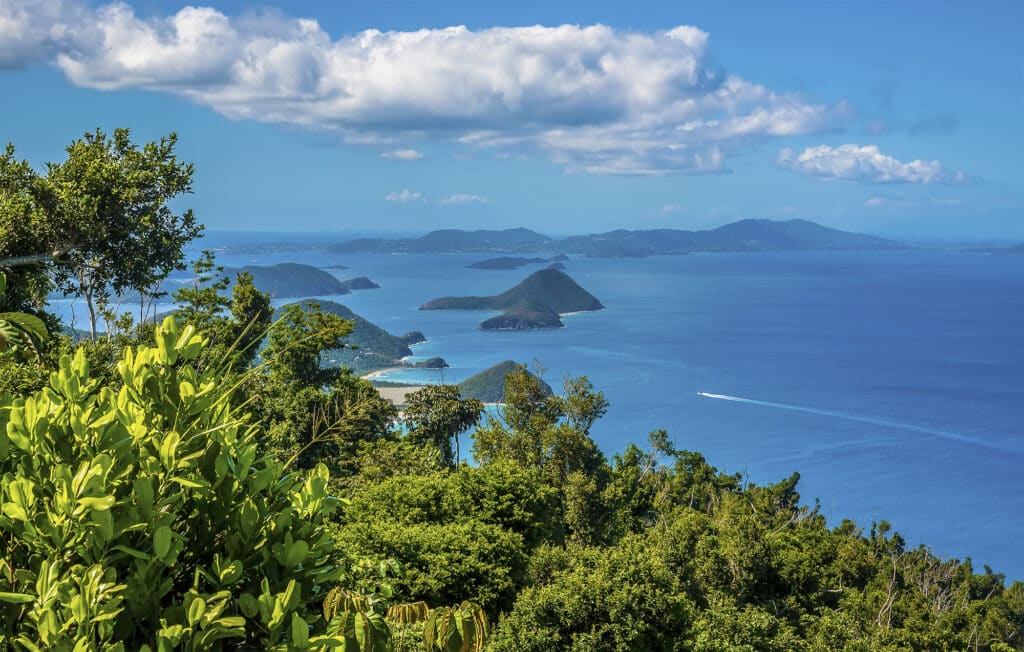
For a permanent residence application to be considered you must live there consecutively for a period of 20 years. You also cannot be out of the territory for more than 90 days in any calendar year.
The only exception to the above is if you have a ‘substantial business presence’ in the territory, or happen to have a net worth of at least $100 million. Should you fall into those categories you may be eligible for immediate residency or even citizenship.
Brunei
- Population: ~445,000 (2021)
- Income Rate: 0%
- Corporate Rate: 18.5%
- Sales Rate: 0%
- Payroll Rate: 0%
- Social Security: 5%
Brunei is a small sovereign state located on the island of Borneo. Considered one of the richest countries in the world thanks to its oil and gas reserves, it too can forgo charging income tax.
For expats looking to move here, permanent residence is a long shot. Without the express approval of the Sultan, your application will be denied outright.
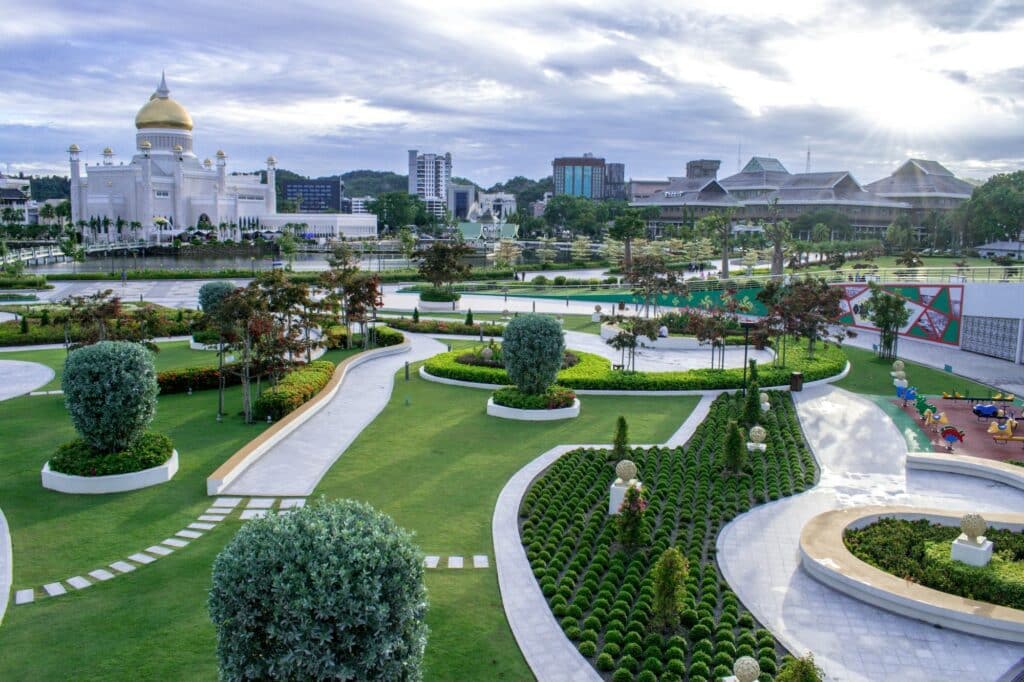
For all but the most select expats, a work permit is the best case scenario for becoming a resident for tax purposes.
Sharia Law has been in effect since 2014. This means that drug offences earn a death penalty. While foreigners can drink alcohol in private, it’s sale is not allowed and any muslim individuals are strictly prohibited from drinking it.
Cayman Islands
- Population: ~68,000 (2021)
- Income Rate: 0%
- Corporate Rate: 0%
- Sales Rate: 0%
- Payroll Rate: 0%
- Social Security: Up to 12.4%
Another British Overseas Territory for this list, these Caribbean islands have long been known by opportunistic individuals looking to lower their tax burden.
Establishing residence here requires a sizeable investment of at least $600,000, typically in either real estate or a local business. You will also need to provide proof of an annual income of $100,000 ($150,000 if you’re a couple) as well.
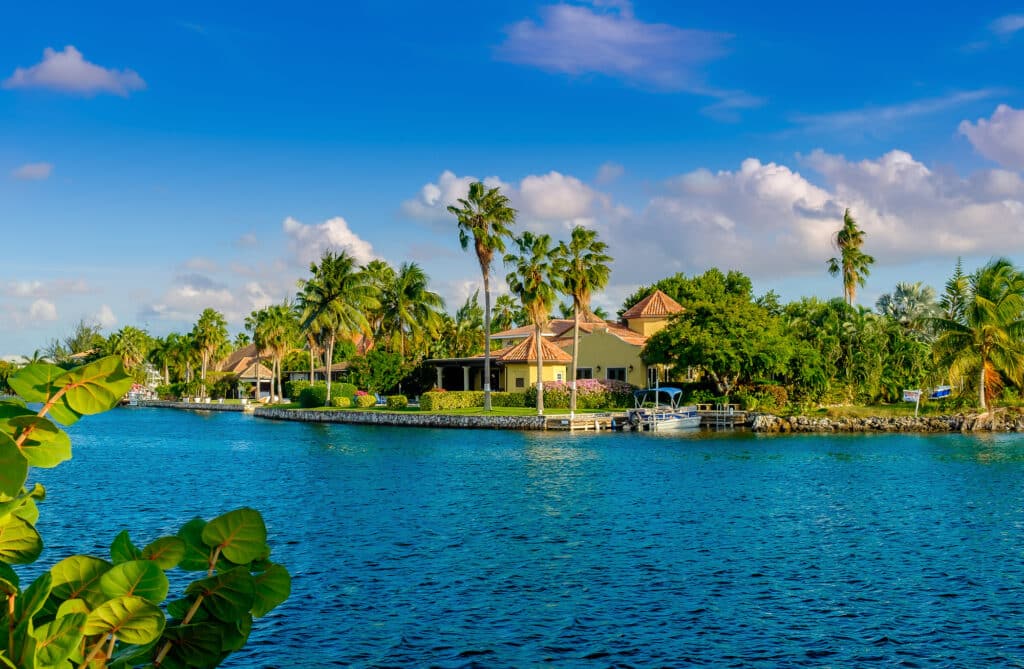
It’s worth noting that these figures are for the pleasure of living on the main island of Grand Cayman. If you’re happy to settle on one of the smaller islands you can get away with half of that amount.
There’s actually a lot more to the Cayman Islands than beautiful, white beaches. As appealing as that is, many people are flocking to this part of the world for the high quality of every day life that it promises.
Kuwait
- Population: ~4,271,000 (2021)
- Income Rate: 0%
- Corporate Rate: 15%
- Sales Rate: 0%
- Payroll Rate: 11.5%
- Social Security: 8%
Like many of its Gulf state counterparts, Kuwait has no need to levy income tax thanks to its rich oil reserves.
Considered to be one of the most friendly expat countries in the world, it’s no wonder foreign nationals account for two-thirds of the population.
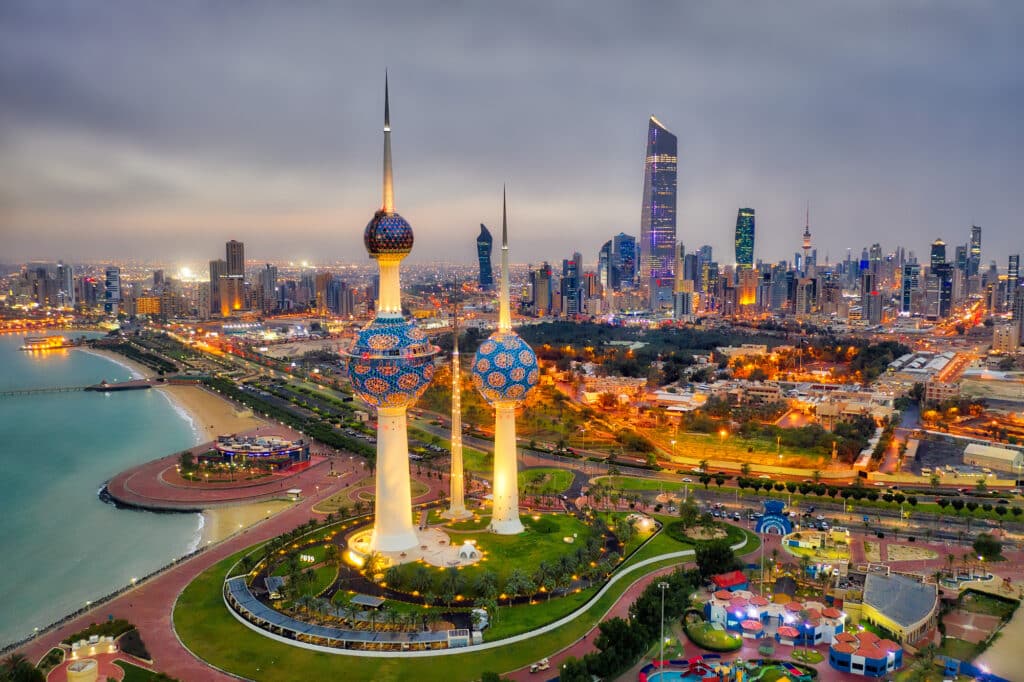
While it would be tax-free heaven to live in Kuwait, it’s by no means easy to obtain permanent residence.
Pretty much the only way to get in is if you’re fortunate to have a blood line from the country, marry a national, or a work permit.
Wealth doesn’t count for much, since they have no need for foreign investment. It’s worth a visit though, so don’t be too quick to scratch it off your bucket list.
The Maldives
- Population: ~530,000 (2021)
- Income Rate: From 0% to 15%
- Corporate Rate: 15%
- Sales Rate: 8% GST
- Payroll Rate: 0%
- Social Security: 7%
The Maldives is a nation of islands in the Indian Ocean. Despite it’s relatively small size, a multitude of expensive holiday resorts make it easy for the small island country to call a moratorium on income tax.
You’ll note that the tax rate is actually as high as 15%. Here’s where it gets tricky; if a foreign citizen stays (legally) in the Maldives for at least 183 days in a year, and isn’t married to a citizen of the Maldives, that person is considered a temporary resident.
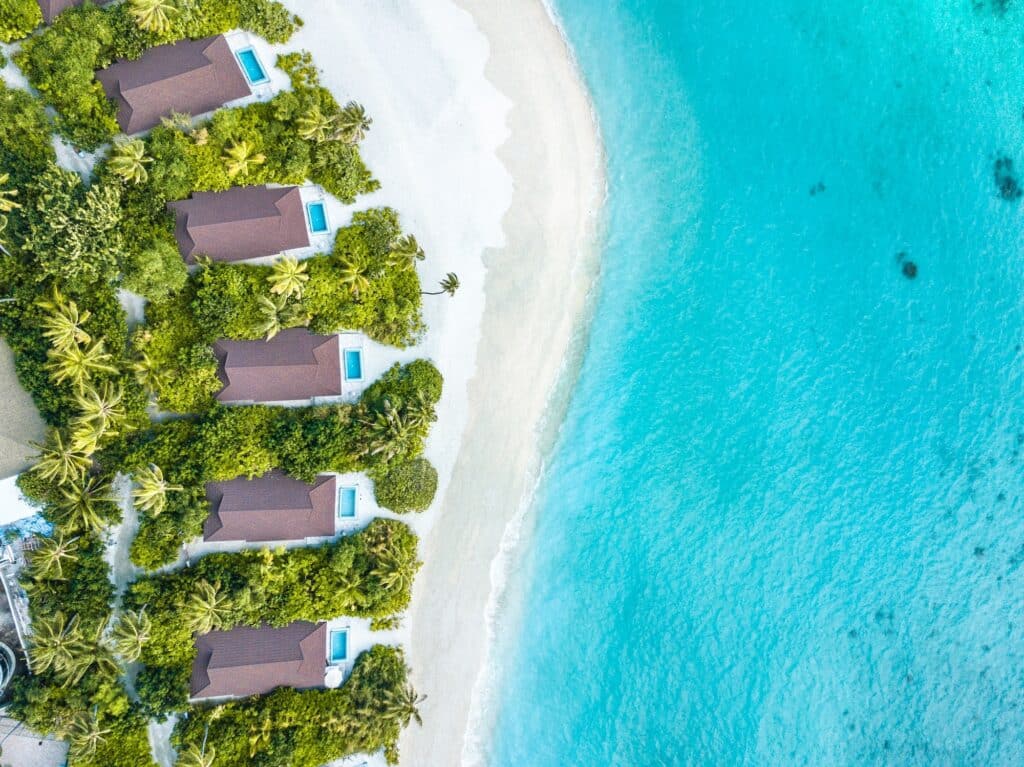
Why does this matter? Well, while permanent residents are taxed on worldwide income, temporary residents are only taxed on income derived from the Maldives. Yet another incentive to build a location independent business!
But, while the Maldives is well set up for tourism, putting down roots here is difficult. The two most common options for moving here are via marriage or a work permit.
Monaco
- Population: ~38,300 (2021)
- Income Rate: 0%
- Corporate Rate: Up to 33.33%
- Sales Rate: 0%
- Payroll Rate: 0%
- Social Security: Up to 21.25%
The Principality of Monaco is a sovereign city-state and microstate on the French Riviera. Similar in size to the Vatican, Monaco is an eye-wateringly expensive place to live and play.
Favoured by the rich elite as a tax haven destination of choice, Monaco boasts plenty of reasons to visit and live there. Not the least of which is the world-famous Formula 1 street circuit running right through the city.

While becoming a resident requires very deep pockets, the application process itself is not complicated.
In addition to the €500,000 deposit, you’re required to rent or purchase property in the principality, as well as prove your financial means.
While the above average cost of living of $8,981 per month might not seem bad on face value, it doesn’t tell the full story. Rentals in Andorra where I live are known to be expensive, but at least they aren’t sized like a shoe box.
Apartments in Monaco renting for €110 per square meter, so many people choose to live in tiny studios to keep the cost down. French citizens considering residency in Monaco should be aware that they will still be subject to French income taxes.
Nauru
- Population: ~12,500 (2021)
- Income Rate: 0% to 20%
- Corporate Rate: 0%
- Sales Rate: 0%
- Payroll Rate: Up to 30%
- Social Security: Up to 10%
I know, another country that technically does have personal income tax. The thing is, for residents of Nauru, their first $250,000 is tax free. It’s only past that point that a 20% personal income tax is applied.
Nauru is a tiny island country northeast of Australia. Named ‘Pleasant Island’ by European sailors, it was anything but for the asylum-seekers locked up in the controversial Australian-run detention facility.
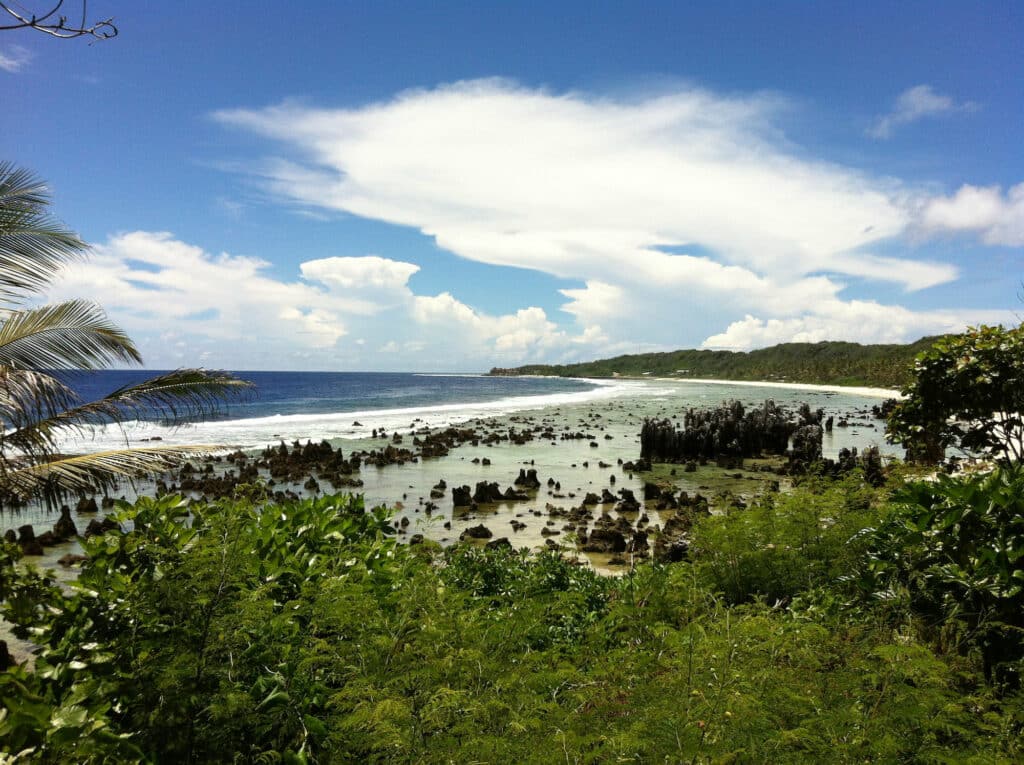
Sadly, the potential of this island nation is unrealised. Environmental problems caused by phosphate mining and limited environmental and health laws is causing trouble on land, while climate change is having an impact on coral, posing significant risks.
Once the wealthiest states in the world, Nauru’s economic downfall began when the phosphate mines became depleted.
Until recently Nauru offered an attractive economic citizenship programme that allowed you to acquire a second citizenship. Pressure from the United States has since put an end to this, but the favourable tax regime continues.
Oman
- Population: ~4,976,000 (2021)
- Income Rate: 0%
- Corporate Rate: 15%
- Sales Rate: 5% VAT
- Payroll Rate: Up to 10.5%
- Social Security: Up to 7%
Oman is located on the southeast corner of the Arabian Peninsula, between Yemen and the UAE. While the country promises a decent quality of life, obtaining residence ain’t easy.
Unless you find work with an international company your only other option is the Investor Residency Programme which requires real estate or commercial investments in the country in order to earn a 5 or 10 year renewable residency visa.

For most Westerners, the conservative Omani culture is an adjustment. Take for example the fact that you need a personal liquor licence from a local police station just to purchase a bottle of wine.
But adjustment is required when moving to almost any new country. That doesn’t mean it’s not worthwhile.
Oman’s quality of life ranks number 8, ahead of Australia in Numbeo’s Quality of Life Index thanks to it’s stable economy, low crime rate and relatively high purchasing power.
Pitcairn Islands
- Population: 47 (2020)
- Income Rate: 0%
- Corporate Rate: 0%
- Sales Rate: 0%
- Payroll Rate: 0%
- Social Security: 0%
In the middle of the Pacific Ocean halfway between New Zealand and South America you’ll find the Pitcairn Islands. Easily missed, they are the most isolated (semi-sovereign) state in the world.
With no airport, Pitcairn is reachable only by ship. What’s worse, annual traffic to the island amounts to a handful of freight ships and the occasional ocean liner.
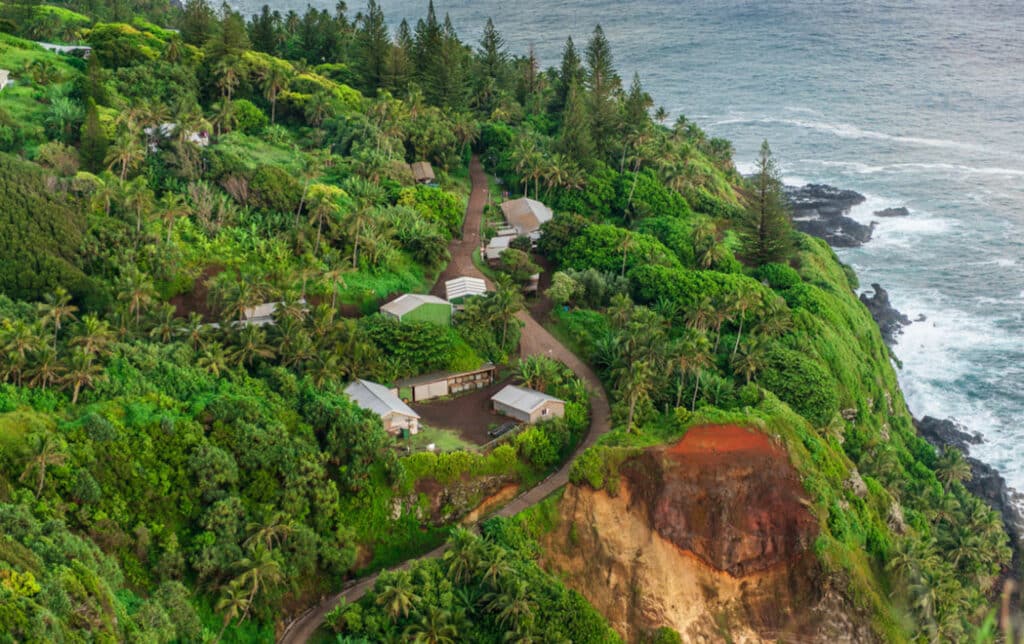
Those visiting the country generally fly to Tahiti, then continue the journey via air a few days later, onwards to Mangareva. From there, a ferry completes the journey to Pitcairn.
Since the government is actively seeking to increase the country’s dwindling population, immigrating to Pitcairn isn’t difficult. To sweeten the deal they’re offering free land to new migrants with the proviso that you build a house within six months.
This, along with its zero tax policy might make it a ‘logically attractive’ proposition. The isolation factor is an obvious deterrent for most of us though.
Qatar
- Population: ~2,688,000 (2021)
- Income Rate: 0%
- Corporate Rate: 10%
- Sales Rate: 0%
- Payroll Rate: 0%
- Social Security: 21%
The peninsular Arab country of Qatar might be small, but it enjoys the highest per capita income in the world. It’s also regarded by many as the most developed country in the Middle East, and the Doha airport is show of this alone.
A relatively peaceful and pleasant place to live, Qatar is the only Gulf country to offer permanent residence for expats. Of course, as is the case with many tax free countries, it is supremely difficult for foreigners to obtain.
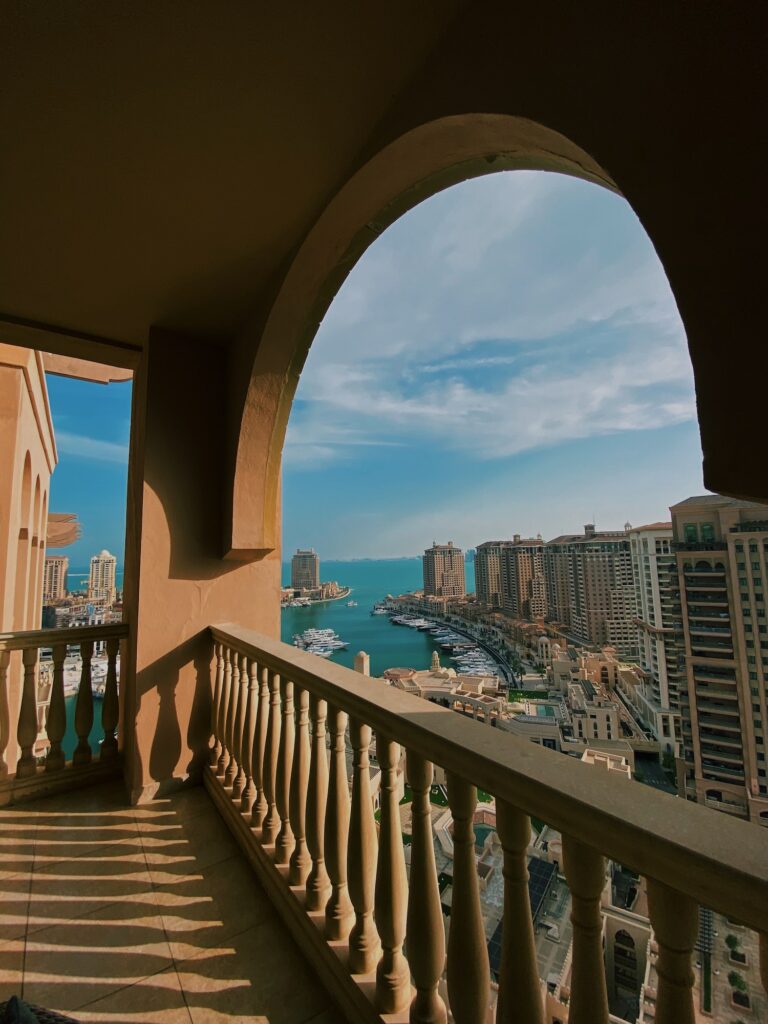
Requirements are notoriously strict. For starters, you must have lived in the country for over 20 years and have a strong command of Arabic to even be eligible.
Knowing this, it’s probably best to focus on finding employment in Qatar, where your employer can take care of the work visa application for you.
Saint Kitts and Nevis
- Population: ~53,000 (2021)
- Income Rate: Up to 5%
- Corporate Rate: Up to 33%
- Sales Rate: 17% VAT
- Payroll Rate: 0%
- Social Security: Up to 11%
Often listed with a 0% tax rate, Saint Kitts and Nevis does actually render tax on some incomes. This rarely affects entrepreneurs and investors however, as it only applies to salaries earned within the country.
This is country without capital gains tax. Dividends, capital gains and other income, like salaries from abroad are tax-free as well..
You’ll find the dual-island nation between the Atlantic Ocean and Caribbean Sea. Known for its mountainous backdrop and beaches, establishing tax-free citizenship here is relatively easy and can take less than a year to complete.
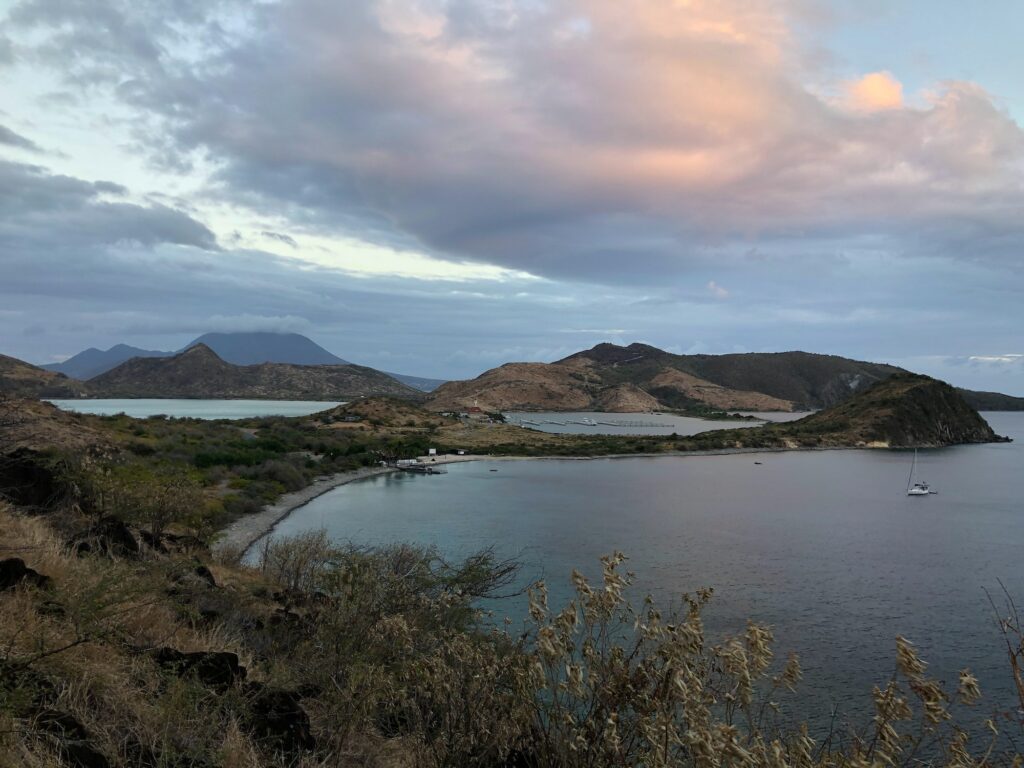
Compared to other places, the cost of their citizenship by investment programme is quite low. Getting a passport requires a donation of $150,000 to the Sustainable Growth Fund or an investment of at least $200,000 in a government-approved real estate project.
With a moderate cost of living, impressive natural beauty and good air links to Europe and North America, this tiny dot in the middle of the ocean could be the tax-free home of your dreams.
Turks and Caicos Islands
- Population: ~45,000 (2021)
- Income Rate: 0%
- Corporate Rate: 0%
- Sales Rate: 0%
- Payroll Rate: 0%
- Social Security: 10%
An archipelago of low-lying coral islands, Turks and Caicos lies southeast of the Bahamas in the Atlantic ocean. Once independent, internal problems later brought them back under the control of the United Kingdom.
Interestingly, where other countries grew into their tax haven status, the TCI came about as a result of a UK government-sponsored study in 1970. Possibly the world’s only openly intentional ‘offshore finance centre’, they subsequently put legislative measures in place to support this aim.
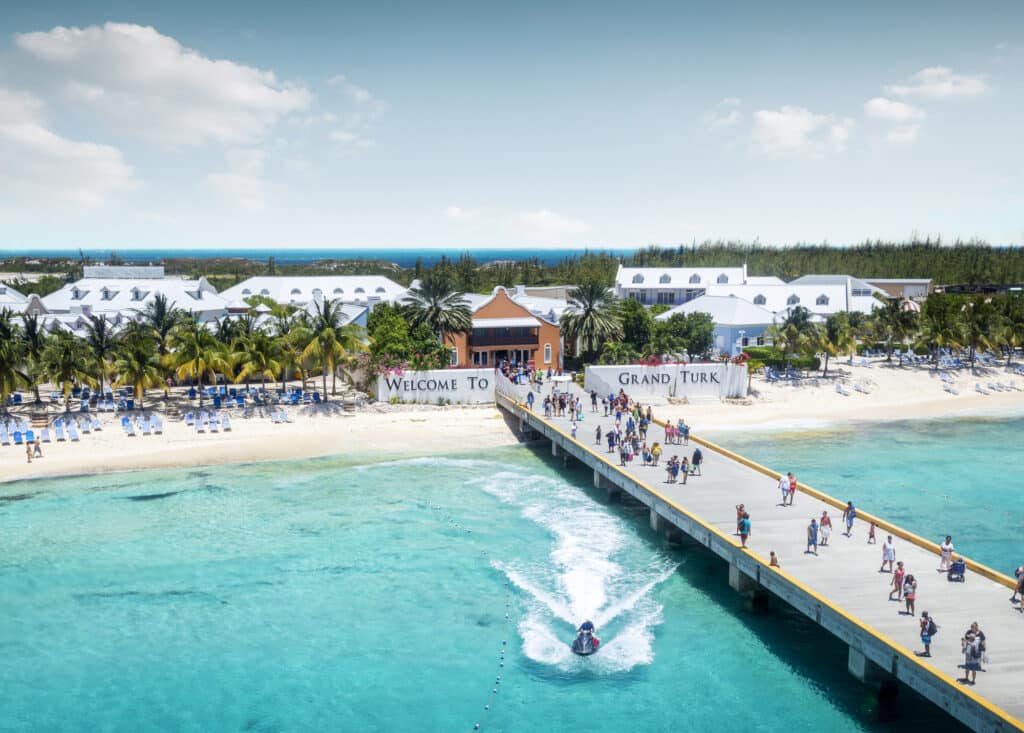
A temporary residence permit can be obtained for those interested in residing in the islands without the right to work. An investment of $500,000 must be made in Providenciales and West Caicos, or $250,000 on any of the other islands. Permits cost $1,500 and must be renewed annually.
Permanent residency is available for those who have been legal residents for over 10 years.
Moving to Turks and Caicos is not without its perks. Residents enjoy an average of 350 days of sunshine annually as well as direct flights to cities throughout Canada and the US.
Saint Barthélemy
- Population: ~9,900 (2017)
- Income Rate: 0%
- Corporate Rate: 15%
- Sales Rate: 0%
- Payroll Rate: 0%
- Social Security: 9.2%
A French-speaking Caribbean island commonly known as St. Barts, Saint Barthélemy is renowned for its impeccable beaches and designer shops.
If you’re an EU citizen, you’re free to live and work on the island.
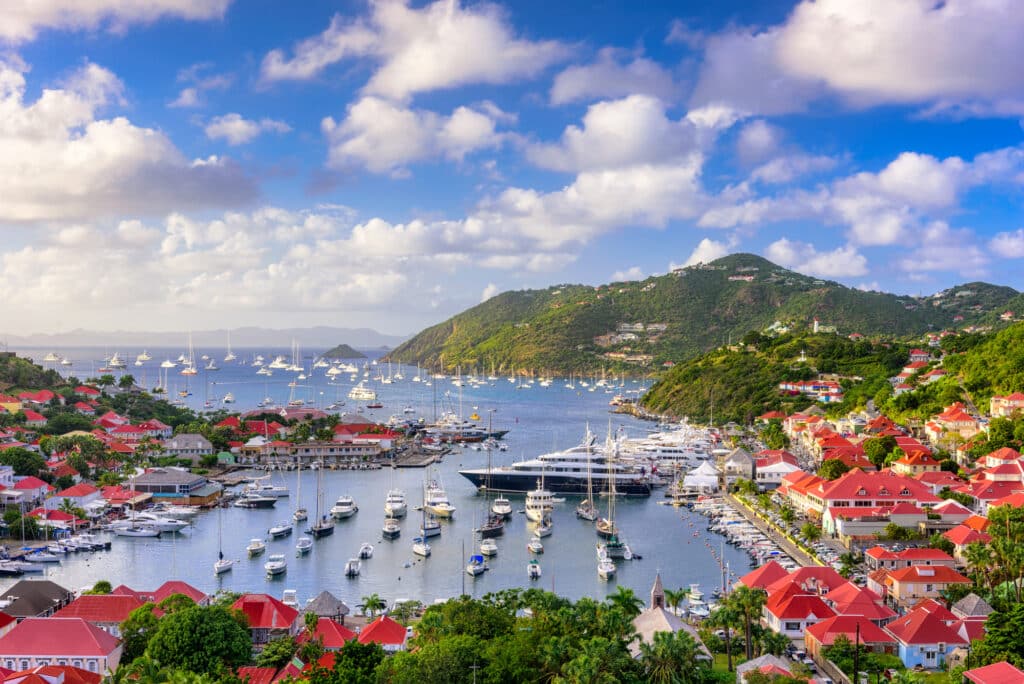
Tourists from the United States and Canada can visit for up to three months without a visa. If you’re from elsewhere you may need a French visa to gain entry.
In order to become a resident for tax purposes, you’ll need to spend at least six months of each year on St. Barts.
One downside for French citizens is that they need to pay French income taxes for their first 5 years of residency.
United Arab Emirates
- Population: ~9,981,000 (2021)
- Income Rate: 0%
- Corporate Rate: Up to 55%
- Sales Rate: 5% (VAT)
- Payroll Rate: 12.5%
- Social Security: 5%
The United Arab Emirates is an elective monarchy formed from a federation of seven emirates, of which Dubai and Abu Dhabi are the two most well known.
Named one of the freest economies in the world by the Index of Economic Freedom, the UAE’s openness to trade and low taxes make it an appealing place to live and work.
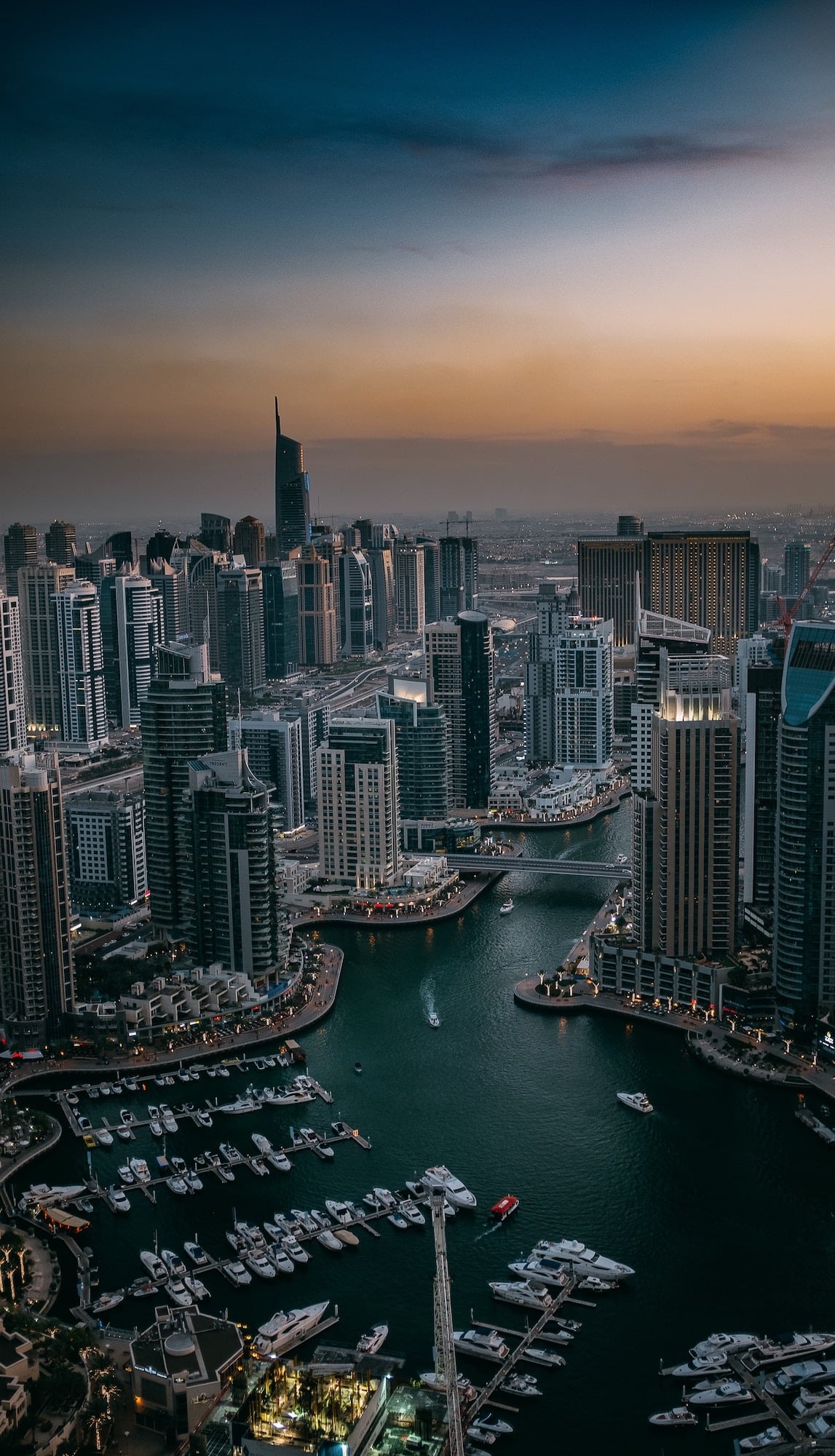
Like its neighbours, the Emirates enjoys considerable wealth from oil exports. Wealth it generously passes onto its residents in the form of a tax-free lifestyle.
The government encourages foreign investment and the country is extremely liveable, making it a good choice if you’re looking to relocate.
While it’s easier to obtain residency than many other Gulf countries, settling in the UAE does require a considerable amount of money. You need to invest at least 10 million AED (about $2.7 million) to be eligible for a ten-year residency visa.
Vanuatu
- Population: ~307,000 (2021)
- Income Rate: 0%
- Corporate Rate: 0%
- Sales Rate: 12.5% VAT
- Payroll Rate: 0%
- Social Security: 4%
Considered by many to be a small piece of paradise in the Pacific Ocean, Vanuatu is especially popular with retirees. Obtaining residence here is relatively easy and not as expensive as many other potential tax-free destinations.
The government re-introduced its citizenship by investment programme to help raise funds to rebuild the damage following a devastating cyclone in 2015. CBI is available to applicants willing to invest $130,000 or more into a local development fund.
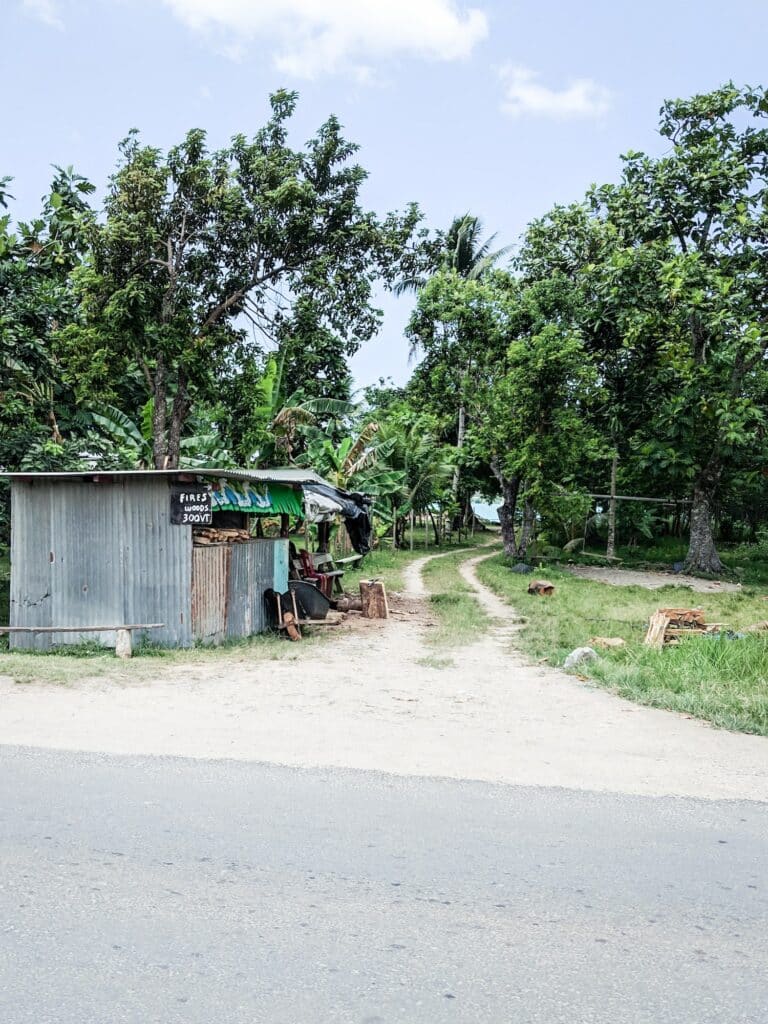
While it may sound appealing to move here, it’s worth noting that no physical residency is required in order to gain Vanuatu citizenship. Vanuatu’s passport has gained considerable strength in recent years, offering visa-free travel to 98 countries around the globe.
The only potential downside to Vanuatu is access. Getting there isn’t as difficult as some other locations on this list, but it’s not as well connected as many high net worth individuals are looking for.
Vatican City State
- Population: ~825 (2021)
- Income Rate: 0%
- Corporate Rate: 0%
- Sales Rate: 0%
- Payroll Rate: 0%
- Social Security: 0%
The Pope isn’t looking for roommates. ????????
If he was, the Vatican City would be an interesting proposition. Located in Rome, the capital city of Italy, it’s extremely well connected to the rest of the world, and just as well kept.
Of course, only high ranking members of the Catholic Church and members of the Swiss Guard will ever have a chance to become residents of Europe’s smallest state.
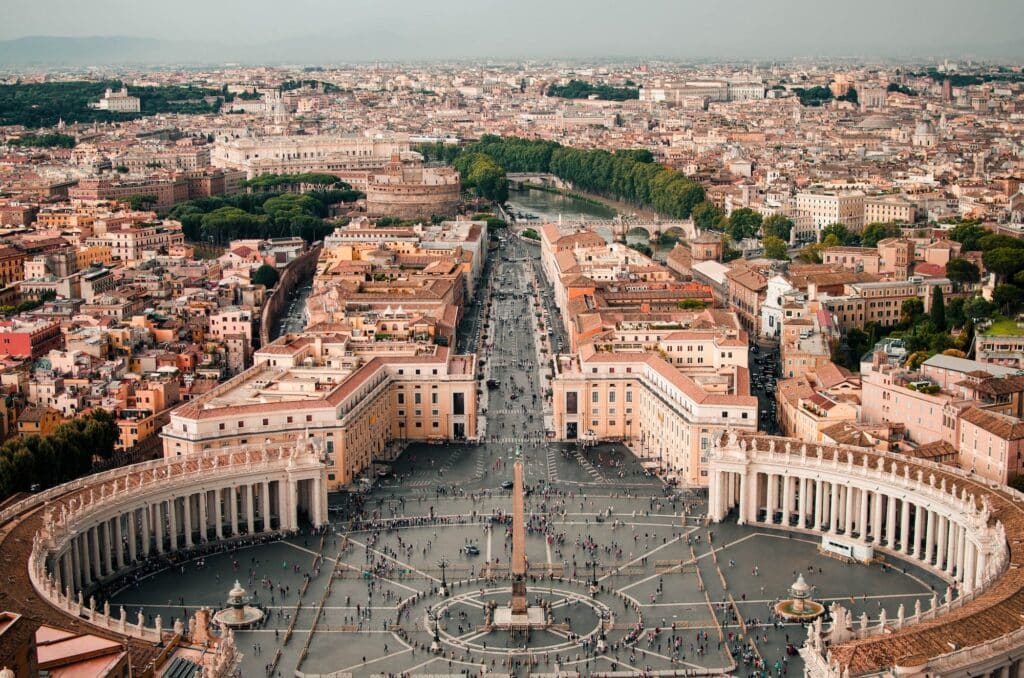
You can at least visit the Vatican City. While you don’t need a visa to enter, the dress code is fairly strict. When you enter the facilities, you’ll soon discover one of many non-tax sources of revenue. Admission, tours, collectible coins and stamps, publications and more, all contribute.
Of course, this doesn’t account for donations, or ‘other financial projects’.
Wallis and Futuna
- Population: ~11,500 (2021)
- Income Rate: 0%
- Corporate Rate: 0%
- Sales Rate: 0%
- Payroll Rate: 20%
- Social Security: 6%
Wallis and Futuna is a French island collective in the South Pacific. Since voting for increased independence, their semi-autonomous status has enabled them to set their own tax-regime.
Thanks to financial support from France as well as some other sources of revenue, the islands are able to exist without a lot of taxation.
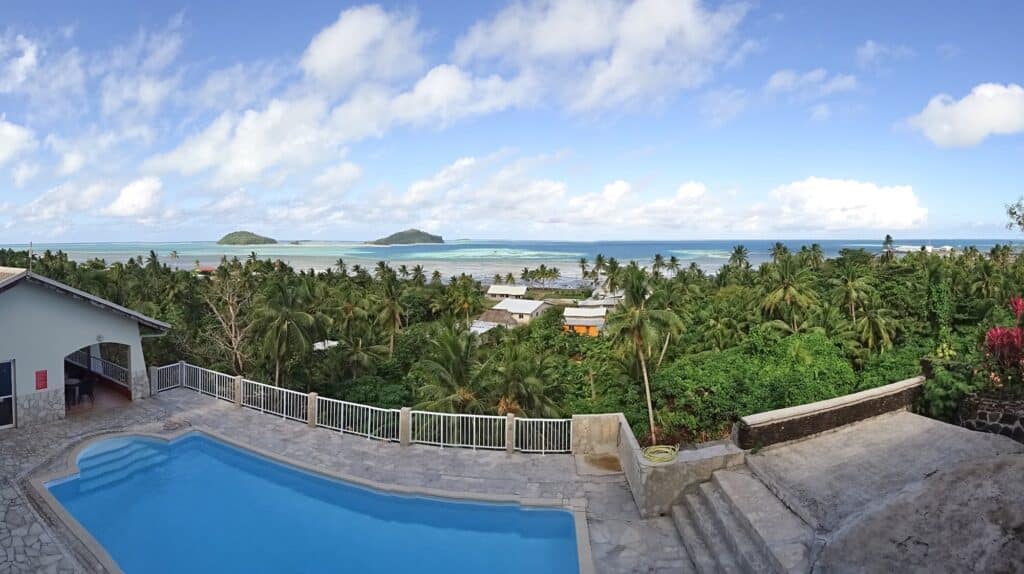
Because Wallis and Futuna is part of France, they fall under the auspices of the EU. As such, EU citizens can settle on the island without much difficulty.
This is not the case for nationals from other parts of the world. If you’re looking to check the place out, you’ll need to obtain a visa beforehand.
Western Sahara
- Population: ~567,000 (2021)
- Income Rate: 0%
- Corporate Rate: 0%
- Sales Rate: 20% VAT
- Payroll Rate: 0%
- Social Security: 0%
Unless you’re on a quest to visit every country in the world, you probably won’t want to go to Western Sahara.
Its status as a tax-free country has more to do with their current status quo as a disputed territory.
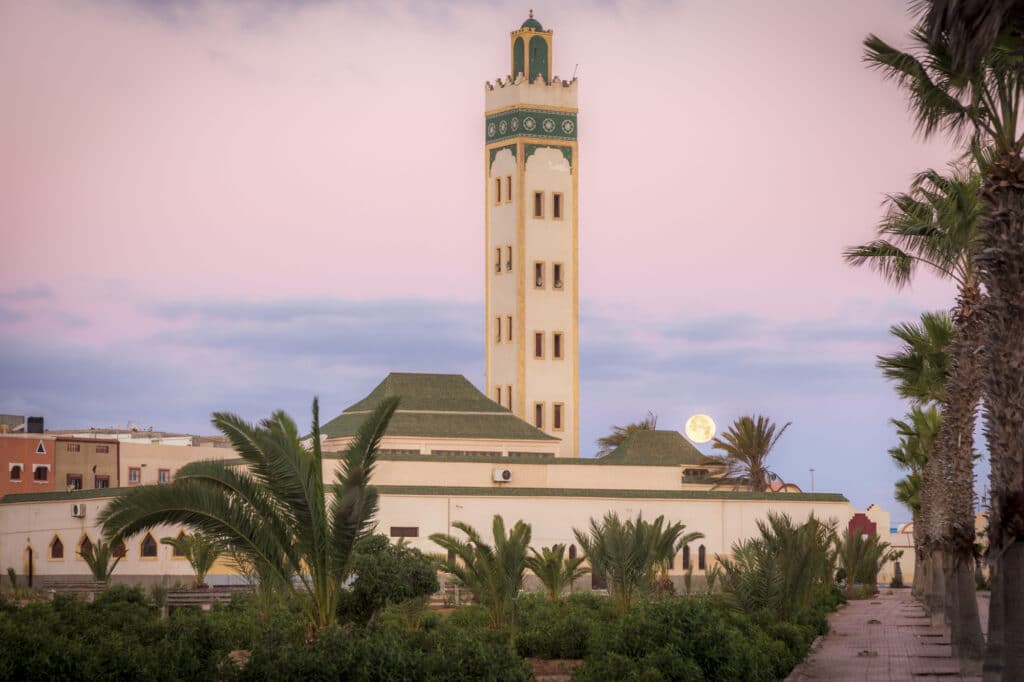
Western Sahara is recognised as a full member of the African Union and enjoys diplomatic relations with 35 countries, so it wouldn’t be fair to dismiss it out of hand.
However, its current instability certainly make it a dubious choice when considering potential places to invest in.
Final Thoughts
As you can see, shopping about for countries without income tax isn’t enough. That in itself doesn’t mean a place is worth moving to.
If nothing more, there’s still the matter of obtaining the legal right to reside there.
From my perspective, there are plenty of other factors that make a place appealing beyond its tax regime.
After spending time in Canada, my wife and I eventually decided to settle in a tiny principality in the Pyrenees.
Living in Andorra affords us a high quality of life that includes an excellent healthcare system, a wide range of school systems for our son and plenty of access to outdoor activities.
For all of that (and more) we’re more than happy to pay a very reasonable 10% into Andorra’s tax system.

Leave a Reply